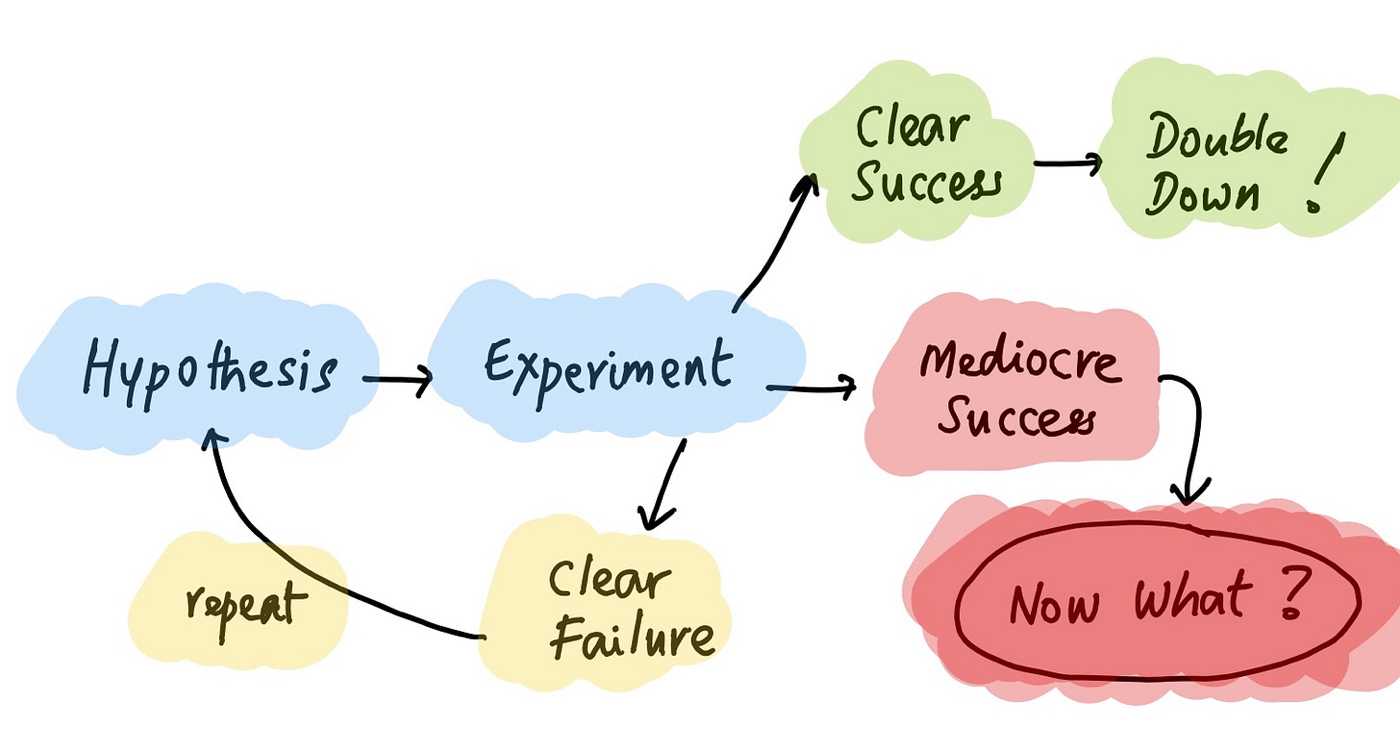
One of the wisest and most important pieces of advice I received as a startup founder was this: “The worst outcome is a mediocre success”
This is not a simplistic exhortation to go big or go home, hit a home run or strike out, be blindly ambitious, or any of those things. It's subtler.
Startups are defined by uncertainty. As a founder, you have to discover almost everything about your business: what is the product? Who are your customers? How will you reach them? How much will they pay? Who are your competitors? How is the industry evolving? The list goes on.
A common way to answer these questions is to take the scientific method and apply it to tech startups. Frame a hypothesis, run an experiment to test the hypothesis, confirm or disprove the hypothesis, learn and iterate, and learn and iterate.
For example, your hypothesis could be that cold-calling customers will lead to sales. So you hire a couple of sales reps and tell them to cold-call 100 customers. If you get 30 new sales out of that (a terrific hit rate)—great, the hypothesis is true! You can hire more sales reps and double down on this tactic. And if you get zero new sales—that’s also great, the hypothesis is false! You can move on to other acquisition tactics, like Facebook ads or SEO or events. Either way, your experiment worked to confirm or disprove the hypothesis.
The worst outcome is to get a small but non-zero number of sales—say, one or two. Now you're in a bind. Do you double down or pull the plug? Does cold-calling work or not? Could it be that the method works but the sales reps aren’t hustling enough? Are they not following the right script or calling the right people? Maybe the method is flawed and your reps just got lucky. You just don't know.
That’s the danger of mediocre success. The point of startup experimentation isn't success or failure itself—it’s the learning. You don't really care about the sales revenue generated by your first two reps; you care whether this is a strategy that you can scale to dozens and then hundreds of reps, or whether you need to use a completely different strategy. It’s all about the learning. And mediocre successes don’t give you any learning.
Unfortunately, there’s a natural human tendency to mitigate risk and hedge our bets—to make design choices in our experiments such that mediocre success is the most likely outcome. There’s also a tendency to only do experiments that you know will work in advance—but such experiments are not useful: the delta in information is close to zero. Back to the sales experiment: as a founder, you could do the calls yourself; reach out only to the very best, most qualified prospects; create custom collateral; and offer sweetheart pricing. All of these actions will increase the chances of closing any one deal. As a result, they’re very tempting. But do they tell you if cold-calling is a viable sales strategy at scale? Nope.
This tendency is exacerbated by the fact that we’re all heavily socialized to aim for mediocre success. Schools, universities, large organizations—they don’t want big swings and big misses; they want safety and consistency. A steady seven is better than tens interspersed with zeros. This might work well in structured, predictable environments, but in startup land, it’s anathema.
So when a startup comes to me with an idea for an experiment, the one thing I tell them is to make sure that there’s a well-defined distinction between success and failure. Don't fall in the messy middle. If the hypothesis fails, make sure it fails clearly and unambiguously. If it succeeds, make sure it succeeds equally clearly and unambiguously.
And remember that a hypothesis failing means the experiment succeeded; you learned something. That’s what it's all about. The worst outcome is mediocre success.
Abraham Thomas is an angel investor based in Toronto. Previously he co-founded Quandl, a successful venture-backed tech startup. He writes occasional essays on data, investing, and startups in his newsletter, Pivotal, where this piece originally appeared.
The Only Subscription
You Need to
Stay at the
Edge of AI
The essential toolkit for those shaping the future
"This might be the best value you
can get from an AI subscription."
- Jay S.
Join 100,000+ leaders, builders, and innovators

Email address
Already have an account? Sign in
What is included in a subscription?
Daily insights from AI pioneers + early access to powerful AI tools







Comments
Don't have an account? Sign up!
Good read.
memo to myself: https://share.glasp.co/kei/?p=qi56me77HbFaBYNbfcb9
Very bad take! As someone said: "you don't have to win anything"
Exact take. The information value is critical. And not being able to act on the information in a meaningful way means you undershot your experimental target. Aim for more extreme outcomes to drive your improvement. It’s not easy - startups need extremes though.
Great real and this makes sense.
Isn’t there a scenario in which the two sales reps fail to generate sales but you don’t know why? Aren’t the ambiguities that characterize mediocre success lurking behind the zero sales result? I.e what if the zero sales result is because the sales reps aren’t hustling enough, are calling the wrong people, or are using the wrong script?
@tonywriter I agree with this. Would like to see more details in the article about how to define unambiguous experiments. In my experience it's very easy to continue making assumptions about a failed experiment rather than having a clear understanding that it failed.
@tonywriter The idea is to have a sharper definition of success and failure to the point where it's a binary outcome. The question about *why it fails* is would lead to another line of hypothesizing which would then require another "loop" through the system.
I have a pet project I'm working on. It is now operational. However, it would be better for me to have a clearer hypothesis for success or failure.
Well said. My takeaway..."make sure that there’s a well-defined distinction between success and failure. Don't fall in the messy middle."
What is not mentioned here is the proportion of risk that is associated with big bets and hence the fact that "high success" comes with a 90% failure rate (incl. VC portfolio). So for most of us humans, mediocre success is good enough.
Even in larger companies, a 2% improvement in revenue is a good achievement from the squad perspective. But you compound those 100 squads and you have a much higher return overall.
Author Tom Robbins said it best, I think: "“So you think that you're a failure, do you? Well, you probably are. What's wrong with that? In the first place, if you've any sense at all you must have learned by now that we pay just as dearly for our triumphs as we do for our defeats. Go ahead and fail. But fail with wit, fail with grace, fail with style. A mediocre failure is as insufferable as a mediocre success. Embrace failure! Seek it out. Learn to love it. That may be the only way any of us will ever be free.”